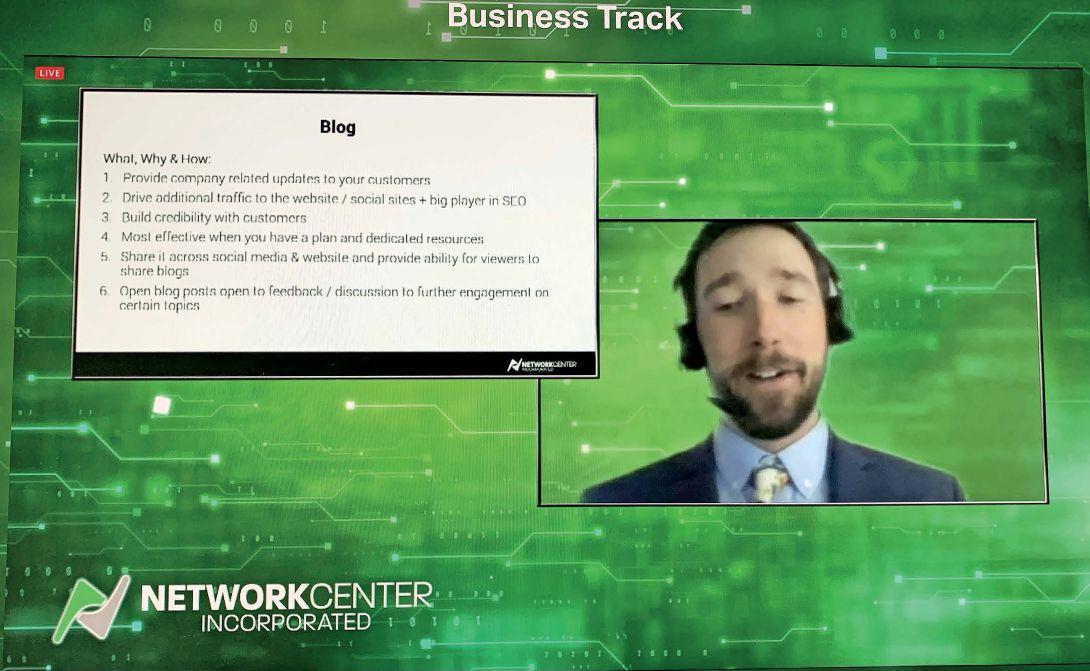
3 minute read
Some takeaways from NCI’s virtual technology conference
By Andrew Weeks
FARGO, N.D. • A number of timely business discussions were offered in November during Network Center Inc.’s 2020 nVision conference.
Unlike other years, the technology and business conference this time was held virtually, with three track sessions that participants could join: business, technical and cybersecurity.
It would have been easy to forgo the conference this year, but doing so, NCI President Ben Carlsrud said, kicking off the meeting on Nov. 12, would be against the core values of the company. It has been a tough year for employers and their employees, not being able to attend social events. Carlsrud said he’s felt some of that disappointment, too.
“How do we bring the new normal into the abnormal? How do we get some normalcy back into our lives? Today is about that,” he said, giving a nod to those who helped plan this year’s conference.
“Even though it’s virtual doesn’t mean there wasn’t some pain and suffering that went into (planning it),” he said. “Maybe even more so.” Each presentation was about 50 minutes long, and participants could ask questions of the presenters virtually. There were many takeaways from the conference, everything from change management to collaboration tools to cybersecurity and the importance for organizations to have a web presence, among a number of other timely topics.
Benefits of a Web Presence
Have you ever Googled yourself or your company? asked Andrew McKenzie, NCI’s interactive service advisor, during the presentation titled “Understanding the impact of a strong web presence.”
Having a website for any business is important because it creates a place for customers to find the company and its services. It is, in fact, the most informative platform available digitally. McKensie said a website is the most flexible platform to portray an organization, and serves as the hub in which other platforms should drive traffic. It also is a great place to showcase a company’s products and services, builds credibility, and should include a call-to-action, such as inviting visitors to sign up for a newsletter. An effective website also should conform to Google analytics.
Everyone wants to be on the front page of Google when a customer looks up the name of an organization, McKenzie said. Perception is important. But how do you get to be number one?
“Google can do a lot for you, but you have to give it information,” he said. “Having a presence that interacts with Google is important.”
An effective website should draw distinctions between your business and others, such as what makes yours stand out?
Also, use tools to make it easier for customers to get in touch with you, which in turn help the customer experience. He said customers these days are looking for easier and quicker engagement with businesses.
An enhanced website might contain a blog, which is one way to engage with audiences, and there is no question that social media is a must-have in this day and age.
It also is extremely important that websites are mobile friendly, as mobile use continues to surge upward and is a highly-used source of internet searches. It is the most popular way people tap the internet these days.
“Choosing to not have a good mobile experience is not a good place to be in these days,” McKenzie said.
Cybersecurity
While online, businesses and their employees need to make sure their assets are protected from cyber threats.

“There are unknown vulnerabilities that are being discovered all of the time,” both inside and outside a company’s network, said Sean Todd, NCI’s director of security, during another presentation.
“Put together some kind of vulnerability program, scan all of the time, and understand vulnerabilities both inside and outside the network,” he advised, noting several tools are available for businesses to leverage.
He said organizations should test against vulnerabilities frequently, and always use caution when opening emails. About 90% of the risk incidents the company responded to this past year for other businesses involved phishing -- a solicitous email that, when opened, encrypts the computer in an effort to steal important information.
John Mess, NCI’s senior security advisor said during the same presentation that executives should train their employees against cyber threats, such as when not to open an email. Educating employees “is your quickest and cheapest way to protect yourself,” he said.
Threats not only come from the internet, such as malware, but from outside sources, including people and weather, which could
knock down power. What would you do in that instance?
Companies should make decisions based around those types of scenarios, too. Tood said by defining risk, owners and managers can make better decisions.
“It’s a lot less expensive to be proactive instead of requiring an incident response,” he said.
Future Conference
Carlsrud said during his introductory remarks that he hopes world conditions will be such that NCI will be able to bring back the in-person experience to next year’s conference. It is something he looks forward to and is hoping to that end.
For this year, he said is excited that NCI was still able to provide this service to the region’s business professionals. He hoped the conference would help business leaders gain some insight that will better prepare them for the approaching new year.
“As soon as we can bring people back together,” he said, “we are going to do that.”










